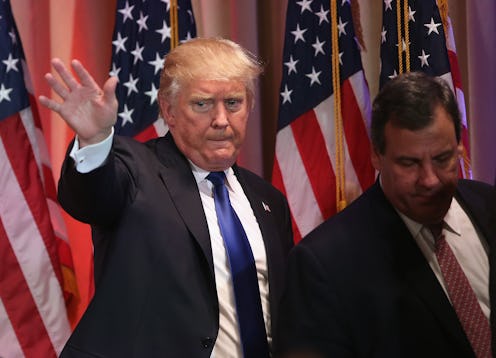News
Donald Trump Could Spark A Contested Convention
On Super Tuesday, Marco Rubio finally won a state for the first time in the primary. But because a single victory in the Minnesota caucuses doesn't get you enough delegates to win the nomination, Rubio and his team are apparently banking on snatching the Republican nomination away from his opponents at the national convention in July. He's not the only one: Donald Trump's dominance in the primary, which was reaffirmed by his strong performance on Super Tuesday, has lots of Republicans taking the idea of a contested convention seriously as their last chance to stop the Donald. Could Donald Trump spark a contested convention, and if so, what would it look like?
Normally, a primary works something like this: One candidate wins the majority of delegates through state voting, those delegates vote to nominate them at the convention, and they become the nominee. But if no candidate receives a majority of delegates through the regular primary process, the floor vote at the convention won't produce in a winner, at which point the convention becomes contested.
Once that happens, the delegates are — within certain rules — allowed to vote for whoever they want. This results in a whole lot of last-minute lobbying on the convention floor by campaigns, and even the candidates themselves, to win over delegates and scrape their way to 50-percent-plus-one.
In order for the 2016 convention to be contested, the non-Trump candidates would have to win enough delegates to prevent Trump from reaching a majority. That's more likely to happen if there are more candidates in the race, because most candidates get at least a few delegates, and that means fewer delegates for Trump. The ironic thing about this, of course, is that the large Republican field is part of why Trump has done so well this far, because the rest of the candidates are splitting the anti-Trump vote.
A couple of weeks ago, the conventional wisdom was that Trump could be defeated if all but one of the remaining candidates dropped out, because this would finally let anti-Trump voters coalesce behind a single candidate. However, it now might be a better idea for them to stay in the race, keep fracturing the vote, and keep Trump from winning a majority of delegates. It's not ideal, but if the main objective is to defeat Trump, this is the safer bet.
The ultimate outcome of a contested convention is anybody's guess. Contested conventions are unpredictable, thrilling, and in the modern historical error, rare. Because of this, they've become something of a white whale for pundits and news junkies — no matter how clear-cut a primary actually is, journalists always speculate that maybe, this year, there will be a contested convention.
It hasn't actually happened since 1952, but this year is different. Seriously. This time, at least one of the campaigns is publicly admitting that it's planning for a contested convention, and that isn't normal. If the Republicans truly wants to stop Trump a contested convention is looking like its only hope. The only question now is how badly they want to stop him.
